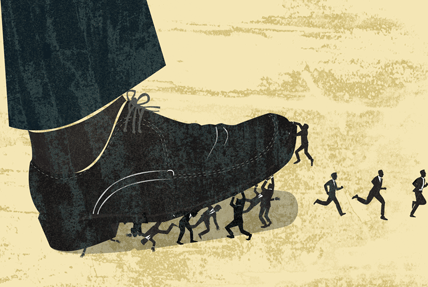What gives you the willies or the jitters? That is, what scares you? If you panic at the thought of getting eaten by a shark, being hit by falling space debris, or dying of Ebola, you can take a deep breath and calm down. The chances of any of those dire scenarios actually happening are slim indeed. A recent study by Chapman University that surveys Americans’ fears shows that we are not all that good at evaluating risks. In other words, our fears seldom match reality. For example, people report being more scared of serial killers than they are of domestic violence. Or, we’re more worried we’ll catch Ebola—probability zero, unless you’re a healthcare worker treating an Ebola-stricken patient—than the flu, which kills about 50,000 people a year nationally.
Fear is an emotional response tied to deep-seated survival “mechanisms” in the brain. Our “threat-triggered defense responses”—goose bumps, weak knees—convey to our brains a “fight-flight-or-freeze” alert. Such pre-rational responses don’t wait for our ability to reason to kick in. This experience of “irrational fear” may, according to some sociologists, have something to do with our collective reactions to “sensational” scary news. As Dr. Christopher Bader, who heads Chapman University’s Survey on American Fears, puts it: “People don’t realize that when they’re watching the news they’re watching the worst possible scenario. That’s why it’s news.” In fact, media outlets, politicians, and advocacy groups have been known to overexaggerate risks for their own personal benefit.
When we are overanxious, we tend to make poor decisions. Someone who fears flying and decides to drive instead is actually choosing the riskier mode of travel. At times, though, people don’t worry enough, such as when they text while driving. Of course, not all fears are unfounded: sharks attacks can be fatal—just not nearly as often as lightning strikes. Which is to say, we would be better off if we gave facts more weight in our decision making. Our assessments of risk and notions about safety, not to mention controversies over health, the environment, and technology, could use a dose of empirical evidence.
Image credit: © Fanatic Studio/Getty Images
Related Links
- What Are You Afraid Of?
“Forget ebola (and Zombies and crashing meteors)”: this article tells you “what you really should fear in 2015.”
(Source: Parade Magazine, January 18, 2015) - The Chapman University Survey on American Fears
This academic center focuses on sociological research into the nature and sources of fears among Americans, through nationwide polling categorized by personal fears, crime, natural disasters, and fear factors.
(Source: Chapman University, Babbie Center; accessed May 6, 2015) - The Only Thing We Have to Fear Is the “Culture of Fear” Itself
This article by sociologist Frank Furedi examines the so-called culture of fear that ensnares so many.
(Source: Spiked, April 4, 2007) - The Relative Risk of Shark Attacks to Humans, Compared to Other Risks
This helpful chart compares statistics on shark attacks with those for various other scary, deadly things, like alligator attacks and collapsing sand holes.
(Source: Florida Museum of Natural History; accessed May 6, 2015) - The Culture of Fear: An Overview of the Book by Barry Glassner
This article takes a look at sociologist Barry Glassner’s classic work on Americans’ fears (the book is available in a new edition).
(Source: About.com; accessed May 6, 2015) - Fear
This article discusses the psychology and physiology of fear, and its sidekick anxiety.
(Source: EmotionalCompetency.com; accessed May 6, 2015)




